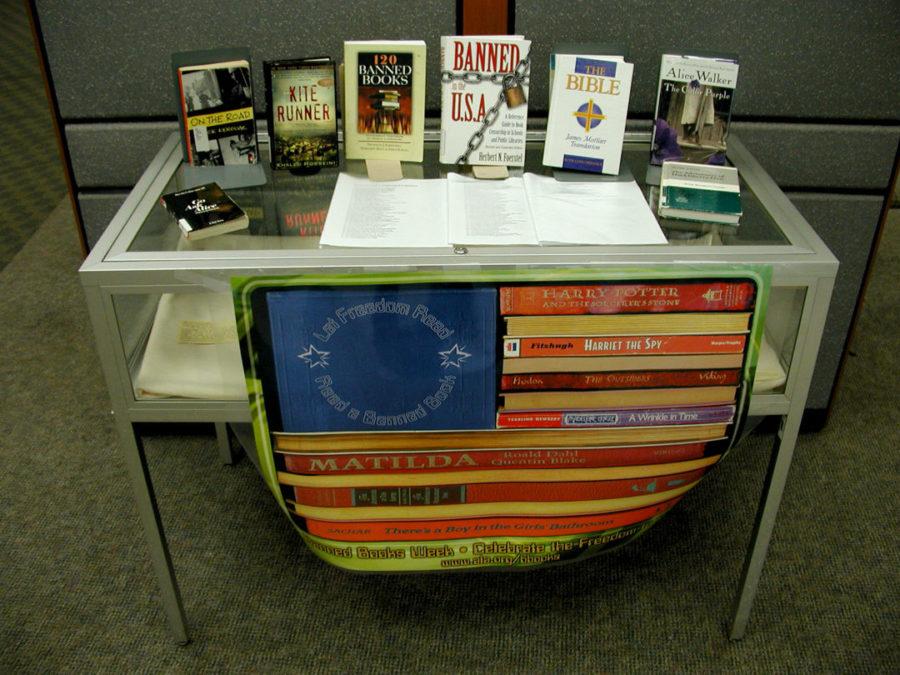Brase: Banning books hinders learning
banned books
March 8, 2016
Think about being banned from school for doing drugs or having sex. When the principal asked you why you did it, you attributed it to a book you read.
I doubt the principal would accept that as your reasoning, so why is it reasonable to ban books if they have not been proven to be the reason behind teenagers’ choices?
We’ve all experienced the banning of books throughout middle school and high school. Books were banned from being read in school because they were considered racist, sexual or violent, and parents did not want their teenagers reading about these subjects.
Obviously, those parents did not know or refused to acknowledge that their teenagers already knew about subjects such as racism, either through personal stories or through their own experiences.
Children learn about sexual education in elementary school, where they are taught what good and bad touch is. They also learn about puberty and what happens to hormones as they mature. In middle school or high school, a condom is put on a banana to teach teenagers about safe sex. Plus, it’s a natural part of a human’s life and not something that should be hidden.
Young adults need to learn what racism and sex is in order to be safe and know right from wrong.
I’m not promoting racist or sexual content in books, but learning about these subjects should not be frowned upon, especially in literature.
Books such as “To Kill a Mockingbird” and “The Perks of Being a Wallflower” have been banned or challenged in the past, but both books, among others, have lessons to teach different viewpoints.
“To Kill a Mockingbird” has been challenged by parents because of its racist comments and because it makes whites the priority.
Yes, the book contains racist elements, but parents cannot protect their children from every racial, sexual comment. The book informs readers on what that time was like. It does not promote racism.
Books allow people to learn about time periods they did not experience and provides an opportunity to live in another world and promote imagination. “To Kill a Mockingbird” is an example of racism and is not the reason racism started, so it should not be banned.
“The Perks of Being a Wallflower” was on the top-10 list of the most challenging books of 2014, according to American Library Association, because of its use of drugs, homosexuality and sexual content.
Although I am not a member of the LGBT community, I found the inclusion of this book on the list of banned books strictly because of its homosexual themes to be extremely offensive. I think it is absolutely wonderful that a book promotes inclusion of homosexual individuals.
Because this is a controversial topic in America, it is even more essential to promote the idea that love is love and everyone deserves to love who they want, no matter their identity.
If parents or teachers don’t want this book to their reading list because of homosexual characters, kids will associate being gay as something negative.
“To Kill a Mockingbird” contains racist themes but it is not more than a representation of that time. In the same vein, “The Perks of Being a Wallflower” takes place during modern times, when gay marriage is legal. Because of this, homosexual themes shouldn’t be seen as means to challenge or ban the book.
Yes, “The Perks of Being a Wallflower” includes the use of drugs, alcohol and sex, but it is a realistic representation of some things that can take place while in high school. Just because a child reads about those subjects does not mean they are going to start smoking marijuana or engaging in sexual intercourse. It makes the book more interesting and engaging and relatable. Reading is supposed to intrigue people and stretch the mind rather than encourage readers to take the safest route.
Student who don’t read the book will still hear about drugs, alcohol and sex through health class, working on projects or papers about the subjects, watching TV shows or seeing advertisements on the topics. They may have even already have had personal experiences with them.
One-third of high school students have already lost their virginity. This statistic has stayed constant since 1991 and that is not the fault of any literature.
Books should not be blamed for decisions made by character for fear it will rub off on its reader. A book is full of words, but a person has a brain to choose what they say or do.

















